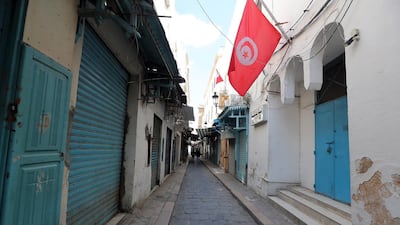Moody's has placed Tunisia on review for a downgrade as the North African country faces weak near-term growth amid the coronavirus pandemic.
Tunisia's central bank, which has a B2 rating and is responsible for the repayment of the government's bonds, is also on review for a possible downgrade, according to the ratings agency.
The decision reflects "the acute tightening in global financing conditions that risks precipitating a sustained period of high financing risk, exacerbated further by Tunisia's weakened near-term economic growth prospects", Moody's said.
Tunisia's economy is projected to shrink 4.3 per cent in 2020, its deepest contraction since it gained independence in 1956, according to the International Monetary Fund. The Washington-based lender approved a $745 million (Dh2.7bn) emergency loan earlier this month to help the North African country mitigate the impact of the Covid-19 pandemic.
Tunisia has 864 confirmed cases of the novel coronavirus, with 37 reported deaths as of Saturday, according to the Johns Hopkins University tracker. The infection has hit the country's crucial tourism sector which generates about 10 per cent of its gross domestic product.
A deteriorating global economic outlook and falling oil prices, as well as asset price declines, have created "an extensive credit shock" across many sectors, regions and markets, noted Moody's.
"For Tunisia, the shock transmits mainly through wider risk premia, a drop in tourism revenue and a sharp slowdown in GDP growth that weaken the sovereign's liquidity and external position and raise its debt burden," the agency said.
Moody's review will run beyond the usual three-month horizon, as it waits to see the country's capacity to handle the economic, financial and social pressures caused by the pandemic.
Limited foreign exchange buffers, a rigid spending structure and challenging social conditions are likely to increase financing risks for the North African state, the agency said.
Tunisia's government relies to a large degree on external official funding, equivalent to around10 to 15 per cent of its GDP. Moody's noted that the Tunisian government may need more funding in addition to the disbursement from the IMF as fiscal and current account deficits could widen.
The agency expects Tunisia's fiscal deficit to grow to more than 5 per cent of GDP in 2020, from 3.5 per cent last year. The agency previously estimated a contraction to 3 per cent in February, before the spread of the pandemic. The country's debt ratio is expected to increase towards 80 per cent of GDP this year, against previous expectations of stabilisation at below 75 per cent.


